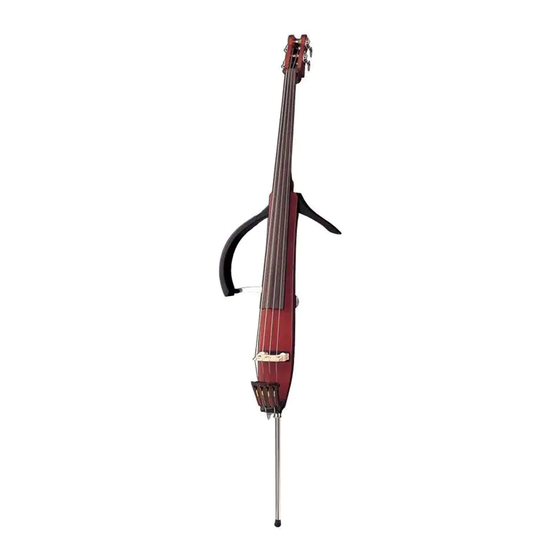Yamaha Silent Bass SLB200 Руководство пользователя - Страница 3
Просмотреть онлайн или скачать pdf Руководство пользователя для Музыкальный инструмент Yamaha Silent Bass SLB200. Yamaha Silent Bass SLB200 15 страниц. Yamaha silent bass owner's manual
Также для Yamaha Silent Bass SLB200: Руководство пользователя (16 страниц)

Your Silent Bass will give you years of reliable service if you follow the simple rules
given below:
■ Location
Do not expose it to the following conditions to avoid
deformation, discoloration, or more serious damage.
• Direct sunlight (e.g. near a window).
• High temperatures (e.g. near a heat source,
outside, or in a car during the daytime).
• Excessive humidity.
• Excessive dust.
• Strong vibration.
■ Power Supply
• Turn the power switch OFF when not in use.
• If you use an AC power adaptor, unplug the
adaptor from the AC outlet if not to be used for an
extended period of time.
• Unplug the AC power adaptor during electric
storms.
• Avoid plugging the AC power adaptor into the
same AC outlet as appliances with high power
consumption, such as electric heaters or ovens.
Also avoid using multi-plug adaptors since these
can result in reduced sound quality and possibly
damage.
■ Turn Power OFF When Making Connections
• To avoid damage to the Silent Bass and other
devices to which it is connected (a sound system,
for example), turn the power switches of all
related devices OFF prior to connecting or
disconnecting audio cables.
Information for Users on Collection and Disposal of Old Equipment and used Batteries
These symbols on the products, packaging, and/or accompanying documents mean that used
electrical and electronic products and batteries should not be mixed with general household waste.
For proper treatment, recovery and recycling of old products and used batteries, please take them
to applicable collection points, in accordance with your national legislation and the Directives 2002/
96/EC and 2006/66/EC.
By disposing of these products and batteries correctly, you will help to save valuable resources and
prevent any potential negative effects on human health and the environment which could otherwise
arise from inappropriate waste handling.
For more information about collection and recycling of old products and batteries, please contact
your local municipality, your waste disposal service or the point of sale where you purchased the
items.
[For business users in the European Union]
If you wish to discard electrical and electronic equipment, please contact your dealer or supplier for
further information.
[Information on Disposal in other Countries outside the European Union]
These symbols are only valid in the European Union. If you wish to discard these items, please
contact your local authorities or dealer and ask for the correct method of disposal.
Note for the battery symbol (bottom two symbol examples):
This symbol might be used in combination with a chemical symbol. In this case it complies with the
requirement set by the Directive for the chemical involved.
■ Handling and Transport
• Never apply excessive force to the controls,
connectors or other parts.
• Always unplug cables by gripping the plug firmly,
not by pulling on the cable.
• Disconnect all cables before moving the unit.
• Physical shocks caused by dropping, bumping, or
placing heavy objects on the unit can result in
scratches and more serious damage.
■ Cleaning
• Clean the cabinet and panel with a dry soft cloth.
• A slightly damp cloth may be used to remove
stubborn grime and dirt.
• Never use cleaners such as alcohol or thinner.
• Avoid placing vinyl objects on top of the unit
(vinyl can stick to and discolor the surface).
■ Electrical Interference
• This unit contains electric circuitry and may cause
interference if placed too close to radio or
television receivers. If this occurs, move it further
away from the affected equipment.
YAMAHA is not responsible for damage
caused by improper handling or operation.
3
